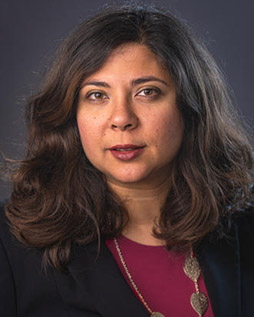
Hanan Badr holds an interim professorship at the Free University in Berlin. She has a secondary appointment as an assistant professor at Department of Journalism at Cairo University. Her profile lies at the intersection of journalism & media studies; political communication and area studies with a focus on the Arab region. Her latest project “Journalism in Transformation” investigates how the political and technological ruptures affected the journalism practices in post-Arab Spring Egypt. In her previous project “Media, Functions in Transition”, funded by the German Research Council DFG, she compared the interplay between the new media and the overlooked ‘old’ media in building the agenda for marginalized publics in North Africa before the 2011 uprisings.
DJRG Fellow, November 2019
Building on postcolonial theory, her research develops a non-Western gaze onto journalism and media and aims at producing authentically informed knowledge on the Global South. Her fields include Journalism and Arab Spring, media & transformation, comparative media systems and Internet and Public sphere. Hanan obtained her doctorate degree (Dr. phil.) from Erfurt University, in Germany, on Framing terrorism in German and Egyptian print media discourses, and published it as monograph with Springer Verlag. She had her M.A. and B.A. at Cairo University at the Department of Journalism.
Title and abstract
One Journalism Crisis for All? Shattered hopes of transformation and fragile (digital) journalism futures outside Western contexts
Considering the structural and digital transformation of the public sphere established rules of the profession and financial viability models seemed shaken, yet new rules in the digital news ecology are not clear yet. In societies where journalism has had different sets of crises, including struggles for freedom but also fragmentation of the professional community itself, in addition to the uncertain new trends in digital journalism we need to reconstruct the meaning of journalism crisis, as journalists themselves see it. The paper brings in important inputs to rethinking (digital) journalism in a non-Western context.
By expanding the matrix of the journalism crisis to an international different setting, this study follows the theoretical lens that views the dimensions of media systems (Hallin and Mancini, 2004; Hafez, 2002; Quandt & Sheufele, 2011). Semi-structured interviews answer the central research question: how do journalists perceive the journalism crisis in a country that struggles within autocratic polarized political environments in the post-Arab Spring years?
In Egypt the term ‘journalism crisis’ has severe connotations: a political tight framework and divided professional community shape the scene. Digital journalism struggles to find recognition: digital journalists are excluded from the union protection as the laws do not recognize them as true journalists. Amid rising platformization, professional and sustainable digital journalism examples are extremely rare and depend on foreign media assistance programs. Added to the socio-economic fragility, censorship, and threats for safety and freedoms, digital journalists work under higher conditions of uncertainty and political targeting.
The journalistic community itself is divided on the reasons of “death of journalism”: politics vs. technology. While regime-critical voices state that freedom will save journalism practice, regime loyalist journalists attribute the crisis to the new technologies and inability to compete with the free available news online and the inability to impose ‘paywalls’ in an economically weak country as Egypt. Divisions from within and pressure from the political system make the future of (digital) journalism uncertain in Egypt.
Selected publications
- Badr, H. (2019). Transformation, Social Media and Hybrid Media Systems – Rethinking media visibility of counter-issues in North Africa before and after the Arab Uprisings. In: IEMed Mediterranean Yearbook 2019: Social networks and political change in the Mediterranean region. Tools of change or instruments of war and hate. Barcelona: European Institute of the Mediterranean (forthcoming).
- Badr, H. (2018). Social Movements, Social Media and the Political Culture: Constitutional Debates in a transformative Post-Revolutionary Egypt. In: Richter, C., Antonakis, A., Harders C. (eds): Digital Media and the Politics of Transformation in the Arab World and Asia. Wiesbaden: Springer VS. https://link.springer.com/chapter/10.1007/978-3-658-20700-7_8
- Richter, C., Badr, H. (2018). Communication Studies in Transformation: Self-Reflections on an Evolving Discipline in Times of Change. In: Kohstall, F., Richter, C., Dhouib, S., Kastner, F. (eds.), Academia in Transformation: Scholars Facing the Arab Uprisings. Baden: Nomos. As Open Access AGYA Working Paper: http://agya.info/fileadmin/user_upload/Working_Groups-images/Transformation/WPS_Academia_in_Transformation/Paper_2_Communication_Studies_in_Transformation_Richter_Badr.pdf
- Badr, H. (2016). Public Sphere, new media and political culture in post-revolutionary Egypt. Orient-Institut Studies.
- Badr, H. (2015). Limitations of the Social Media Euphoria in Communication Studies. Égypte/Monde arabe, 13. URL: http://ema.revues.org/3451